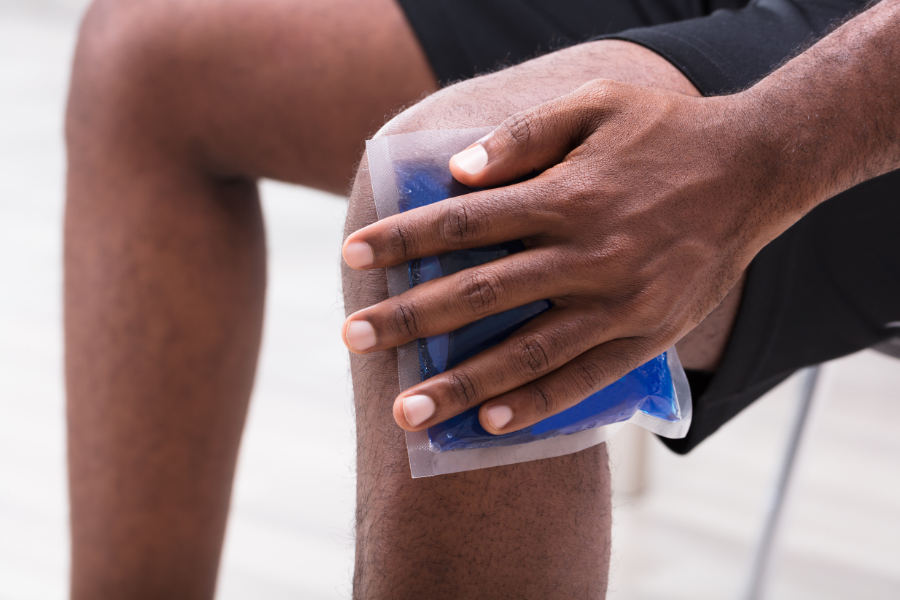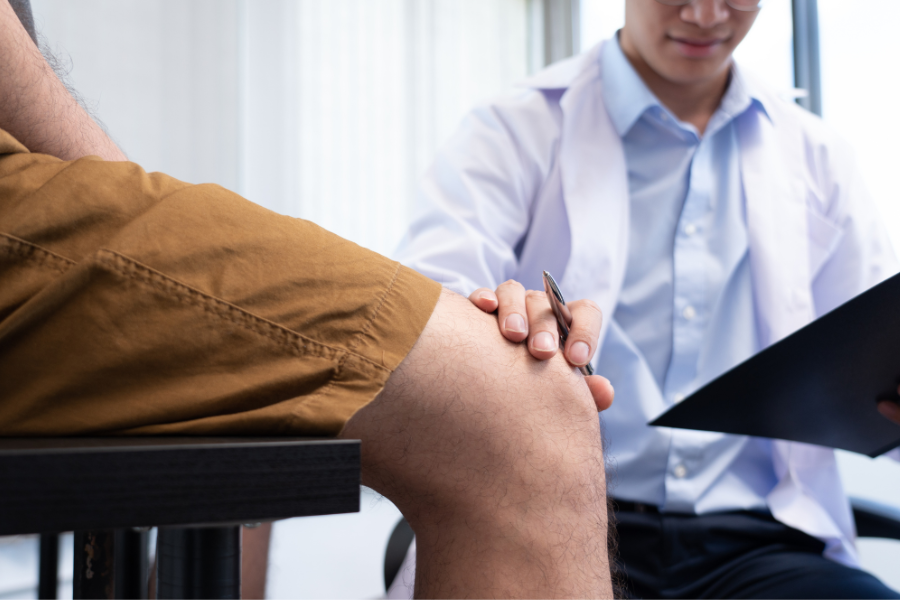What Could Be the Cause of Morning Knee Pain?
- What Can Cause Knee Pain Without Injury?
- Treatment Options for Knee Pain with No Cause
- What Should I Do?
It’s not uncommon to wake up with knee pain, even if you haven’t sustained an injury. Nearly 25% of adults experience knee pain at some point without a clear injury. If you experience knee discomfort in the morning, it could be due to a lack of movement throughout the night, which tightens muscles and tissues around the knee joint. However, if the pain persists, an underlying cause may need to be identified and addressed.
 Where Does Non-Injury-Related Knee Pain Come From?
Where Does Non-Injury-Related Knee Pain Come From?
Experiencing knee pain without a specific injury can be perplexing, as several conditions could be causing the issue. Knee pain unrelated to an injury can often be traced back to underlying conditions such as arthritis or inflammation.
Bursitis
Bursitis is a medical condition characterized by the inflammation of bursae, which are small fluid filled sacs present in different parts of the body, particularly around the joints. These bursae function as cushions between tendons, muscles, bones, and skin, thus minimizing friction and promoting smooth movement of these components. Certain activities or occupations that involve repetitive movements or prolonged pressure on specific joints can increase the likelihood of developing bursitis.
Tendinitis
Tendinitis, also known as tendonitis, is characterized by the inflammation or irritation of a tendon – a thick, fibrous tissue that connects muscle to bone. This condition usually arises from overuse, repetitive motion, or sudden injury, causing pain, tenderness, and sometimes swelling in the area surrounding the affected tendon.
Baker’s Cyst
A popliteal cyst, also known as Baker’s cyst, is a swelling filled with fluid that appears at the back of the knee. The cyst develops when excess fluid accumulates in the joint, forming a lump and creating a bulge. Baker’s cysts are often associated with arthritis or knee joint injuries.
In most cases, Baker’s cysts will resolve independently, but treatment may be necessary if they cause severe discomfort or limit mobility.
Osteoarthritis
Osteoarthritis, also known as “wear-and-tear” arthritis, occurs when the cartilage that cushions the ends of bones within a joint gradually wears down over time. Aging, joint damage, obesity, excessive joint use, and genetic factors are just a few of the causes of this condition.
According to research, osteoarthritis affects more than 30 million Americans, making it a common cause of knee discomfort.
Rheumatoid Arthritis
Rheumatoid arthritis, unlike osteoarthritis, can affect multiple joints simultaneously. It is known for causing inflammation, pain, swelling, and stiffness in joints – especially smaller joints in the hands and feet. With time, it can lead to joint damage and deformity.
This autoimmune disorder occurs when the immune system attacks the synovium, the lining of the membranes surrounding the joints. Although the exact cause of this immune response is not fully understood, it is believed to result from a combination of genetic and environmental factors.
 Options for Treating Knee Pain
Options for Treating Knee Pain
You should seek professional guidance if you are experiencing persistent knee pain without a clear injury. However, if you are trying to manage the pain or seeking treatment, here are some steps you could take:
- Give your knee some rest.
- Apply ice.
- Consider taking anti-inflammatory medication.
- Look into rehabilitation or physical therapy.
- Try targeted exercises and stretches.
- Manage your weight.
- Consider using orthotic support.
If the condition is severe, some patients may require surgery to improve their movement and overall quality of life. There are several procedures available that could be considered as a treatment option:
- Arthroscopic Surgery: A procedure that uses minimally invasive techniques to identify and resolve issues such as cartilage damage.
- Total Knee Replacement: A process that involves the replacement of damaged joints with artificial components to alleviate pain and enhance functionality.
- Partial Knee Replacement: A surgical approach that only replaces the affected portion of the knee joint.
- Knee Ligament Reconstruction: A method that repairs or reconstructs torn ligaments to achieve stability.
- Cartilage Repair: Various techniques can stimulate new cartilage growth or replace damaged areas.
- Lateral Release: A procedure that addresses patellar issues by releasing tight structures around the kneecap.
- Synovectomy: A surgical treatment that removes the inflamed lining of the joint (synovium) to decrease pain and swelling.
Surgeries are an option only when the condition is specific, its severity is considered, and conservative treatments have failed to produce desired results.
 What Should I Do?
What Should I Do?
Various underlying conditions can cause knee pain, even without an apparent injury. Proper treatment and awareness of the underlying causes lead to effective management and relief. If you are experiencing knee discomfort, know that knee specialists are available at the Orlando Orthopaedic Center who can help you. They are well-equipped to diagnose the cause of your knee pain and provide specialized care. Don’t hesitate to schedule an appointment with them to get your needed treatment.